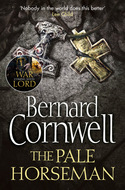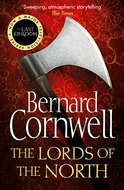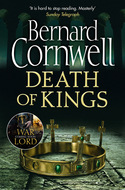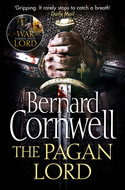Kitap dosya olarak indirilemez ancak uygulamamız üzerinden veya online olarak web sitemizden okunabilir.
Kitabı oku: «The Last Kingdom Series», sayfa 2
Fifty-three bodies hung by the river. A warning to those who might follow. Fifty-three signals that other raiders were risking death by rowing up the Temes.
Then we went home, taking the enemy ship with us.
And Serpent-Breath slept in her scabbard.
PART ONE
The Bride

One
‘The dead speak,’ Æthelwold told me. He was sober for once. Sober and awed and serious. The night wind snatched at the house and the rushlights flickered red in the wintry draughts that whipped from the roof’s smoke-hole and through the doors and shutters.
‘The dead speak?’ I asked.
‘A corpse,’ Æthelwold said, ‘he rises from the grave and he speaks.’ He stared at me wide-eyed, then nodded as if to stress that he spoke the truth. He was leaning towards me, his clasped hands fidgeting between his knees. ‘I have seen it,’ he added.
‘A corpse talks?’ I asked.
‘He rises!’ He wafted a hand to show what he meant.
‘He?’
‘The dead man. He rises and he speaks.’ He still stared at me, his expression indignant. ‘It’s true,’ he added in a voice that suggested he knew I did not believe him.
I edged my bench closer to the hearth. It was ten days after I had killed the raiders and hanged their bodies by the river, and now a freezing rain rattled on the thatch and beat on the barred shutters. Two of my hounds lay in front of the fire and one gave me a resentful glance when I scraped the bench, then rested his head again. The house had been built by the Romans, which meant the floor was tiled and the walls were of stone, though I had thatched the roof myself. Rain spat through the smoke-hole. ‘What does the dead man say?’ Gisela asked. She was my wife and the mother of my two children.
Æthelwold did not answer at once, perhaps because he believed a woman should not take part in a serious discussion, but my silence told him that Gisela was welcome to speak in her own house and he was too nervous to insist that I dismiss her. ‘He says I should be king,’ he admitted softly, then gazed at me, fearing my reaction.
‘King of what?’ I asked flatly.
‘Wessex,’ he said, ‘of course.’
‘Oh, Wessex,’ I said, as though I had never heard of the place.
‘And I should be king!’ Æthelwold protested. ‘My father was king!’
‘And now your father’s brother is king,’ I said, ‘and men say he is a good king.’
‘Do you say that?’ he challenged me.
I did not answer. It was well enough known that I did not like Alfred and that Alfred did not like me, but that did not mean Alfred’s nephew, Æthelwold, would make a better king. Æthelwold, like me, was in his late twenties, and he had made a reputation as a drunk and a lecherous fool. Yet he did have a claim to the throne of Wessex. His father had indeed been king, and if Alfred had possessed a thimbleful of sense he would have had his nephew’s throat sliced to the bone. Instead Alfred relied on Æthelwold’s thirst for ale to keep him from making trouble. ‘Where did you see this living corpse?’ I asked, instead of answering his question.
He waved a hand towards the north side of the house. ‘On the other side of the street,’ he said. ‘Just the other side.’
‘Wæclingastræt?’ I asked him, and he nodded.
So he was talking to the Danes as well as to the dead. Wæclingastræt is a road that goes north-west from Lundene. It slants across Britain, ending at the Irish Sea just north of Wales, and everything to the south of the street was supposedly Saxon land, and everything to the north was yielded to the Danes. That was the peace we had in that year of 885, though it was a peace scummed with skirmish and hate. ‘Is it a Danish corpse?’ I asked.
Æthelwold nodded. ‘His name is Bjorn,’ he said, ‘and he was a skald in Guthrum’s court, and he refused to become a Christian so Guthrum killed him. He can be summoned from his grave. I’ve seen it.’
I looked at Gisela. She was a Dane, and the sorcery that Æthelwold described was nothing I had ever known among my fellow Saxons. Gisela shrugged, suggesting that the magic was equally strange to her. ‘Who summons the dead man?’ she asked.
‘A fresh corpse,’ Æthelwold said.
‘A fresh corpse?’ I asked.
‘Someone must be sent to the world of the dead,’ he explained, as though it were obvious, ‘to find Bjorn and bring him back.’
‘So they kill someone?’ Gisela asked.
‘How else can they send a messenger to the dead?’ Æthelwold asked pugnaciously.
‘And this Bjorn,’ I asked, ‘does he speak English?’ I put the question for I knew that Æthelwold spoke little or no Danish.
‘He speaks English,’ Æthelwold said sullenly. He did not like being questioned.
‘Who took you to him?’ I asked.
‘Some Danes,’ he said vaguely.
I sneered at that. ‘So some Danes came,’ I said, ‘and told you a dead poet wanted to speak to you, and you meekly travelled into Guthrum’s land?’
‘They paid me gold,’ he said defensively. Æthelwold was ever in debt.
‘And why come to us?’ I asked. Æthelwold did not answer. He fidgeted and watched Gisela, who was teasing a thread of wool onto her distaff. ‘You go to Guthrum’s land,’ I persisted, ‘you speak to a dead man, and then you come to me. Why?’
‘Because Bjorn said you will be a king too,’ Æthelwold said. He had not spoken loudly, but even so I held up a hand to hush him and I looked anxiously at the doorway as if expecting to see a spy listening from the darkness of the next room. I had no doubt Alfred had spies in my household and I thought I knew who they were, but I was not entirely certain that I had identified all of them, which was why I had made sure all the servants were well away from the room where Æthelwold and I talked. Even so it was not wise to say such things too loudly.
Gisela had stopped spinning the wool and was staring at Æthelwold. I was too. ‘He said what?’ I asked.
‘He said that you, Uhtred,’ Æthelwold went on more quietly, ‘will be crowned King of Mercia.’
‘Have you been drinking?’ I asked.
‘No,’ he said, ‘only ale.’ He leaned towards me. ‘Bjorn the Dead wishes to speak to you also, to tell you your fate. You and me, Uhtred, will be kings and neighbours. The gods want it and they sent a dead man to tell me so.’ Æthelwold was shaking slightly, and sweating, but he was not drinking. Something had scared him into sobriety, and that convinced me he spoke the truth. ‘They want to know if you are willing to meet the dead,’ he said, ‘and if you are then they will send for you.’
I looked at Gisela who merely looked back at me, her face expressionless. I stared back at her, not waiting for a response, but because she was beautiful, so beautiful. My dark Dane, my lovely Gisela, my bride, my love. She must have known what I was thinking, for her long, grave face was transformed by a slow smile. ‘Uhtred is to be king?’ she asked, breaking the silence and looking at Æthelwold.
‘The dead say so,’ Æthelwold said defiantly. ‘And Bjorn heard it from the three sisters.’ He meant the Fates, the Norns, the three sisters who weave our destiny.
‘Uhtred is to be King of Mercia?’ Gisela asked dubiously.
‘And you will be the queen,’ Æthelwold said.
Gisela looked back to me. She had a quizzical look, but I did not try to answer what I knew she was thinking. Instead I was reflecting that there was no king in Mercia. The old one, a Saxon mongrel on a Danish leash, had died, and there was no successor, while the kingdom itself was now split between Danes and Saxons. My mother’s brother had been an ealdorman in Mercia before he was killed by the Welsh, so I had Mercian blood. And there was no king in Mercia.
‘I think you had better hear what the dead man says,’ Gisela spoke gravely.
‘If they send for me,’ I promised, ‘I will.’ And so I would, because a dead man was speaking and he wanted me to be a king.
Alfred arrived a week later. It was a fine day with a pale blue sky in which the midday sun hung low above a cold land. Ice edged the sluggish channels where the River Temes flowed about Sceaftes Eye and Wodenes Eye. Coot, moorhen and dabchicks paddled at the edge of the ice, while on the thawing mud of Sceaftes Eye a host of thrush and blackbirds hunted for worms and snails.
This was home. This had been my home for two years now. Home was Coccham, at the edge of Wessex where the Temes flowed towards Lundene and the sea. I, Uhtred, a Northumbrian lord, an exile and a warrior, had become a builder, a trader and a father. I served Alfred, King of Wessex, not because I wished to, but because I had given him my oath.
And Alfred had given me a task; to build his new burh at Coccham. A burh was a town turned into a fortress and Alfred was riveting his kingdom of Wessex with such places. All around the boundaries of Wessex, on the sea, on the rivers and on the moors facing the wild Cornish savages, the walls were being built. A Danish army could invade between the fortresses, but they would discover still more strongholds in Alfred’s heartland, and each burh held a garrison. Alfred, in a rare moment of savage elation, had described the burhs to me as wasps’ nests from which men could swarm to sting the attacking Danes. Burhs were being made at Exanceaster and Werham, at Cisseceastre and Hastengas, at Æscengum and Oxnaforda, at Cracgelad and Wæced, and at dozens of places between. Their walls and palisades were manned by spears and shields. Wessex was becoming a land of fortresses, and my task was to make the little town of Coccham into a burh.
The work was done by every West Saxon man over the age of twelve. Half of them worked while the other half tended the fields. At Coccham I was supposed to have five hundred men serving at any one time, though usually there were fewer than three hundred. They dug, they banked, they cut timber for walls, and so we had raised a stronghold on the banks of the Temes. In truth it was two strongholds, one on the river’s southern bank and the other on Sceaftes Eye, which was an island splitting the river into two channels, and in that January of 885 the work was nearly done and no Danish ship could now row upstream to raid the farms and villages along the river’s bank. They could try, but they must pass my new ramparts and know that my troops would follow them, trap them ashore and kill them.
A Danish trader called Ulf had come that morning, tying his boat at the wharf on Sceaftes Eye where one of my officials prodded through the cargo to assess the tax. Ulf himself, grinning toothlessly, climbed up to greet me. He gave me a piece of amber wrapped in kidskin. ‘For the Lady Gisela, lord,’ he said. ‘She is well?’
‘She is,’ I said, touching Thor’s hammer that hung around my neck.
‘And you have a second child, I hear?’
‘A girl,’ I said, ‘and where did you hear of her?’
‘Beamfleot,’ he said, which made sense. Ulf was a northerner, but no ships were making the voyage from Northumbria to Wessex in the depth of this cold winter. He must have spent the season in southern East Anglia, on the long intricate mudflats of the Temes estuary. ‘It isn’t much,’ he said, gesturing at his cargo. ‘I bought some hides and axe blades in Grantaceaster and thought I’d come upriver to see if you Saxons have any money left.’
‘You came upriver,’ I told him, ‘to see whether we’d finished the fortress. You’re a spy, Ulf, and I think I’ll hang you from a tree.’
‘No, you won’t,’ he said, unmoved by my words.
‘I’m bored,’ I said, putting the amber into my pouch, ‘and watching a Dane twitch on a rope would be amusing, wouldn’t it?’
‘You must have been laughing when you hanged Jarrel’s crew then,’ he said.
‘Was that who it was?’ I asked. ‘Jarrel? I didn’t ask his name.’
‘I saw thirty bodies,’ Ulf said, jerking his head downstream, ‘maybe more? All hanging from trees and I thought, that looks like Lord Uhtred’s work.’
‘Only thirty?’ I said, ‘there were fifty-three. I should add your miserable corpse, Ulf, to help make up the numbers.’
‘You don’t want me,’ Ulf said cheerfully, ‘you want a young one, because young ones twitch more than us old ones.’ He peered down at his boat and spat towards a red-haired boy who was staring vacantly across the river. ‘You could hang that little bastard. He’s my wife’s oldest boy and nothing but a piece of toad gristle. He’ll twitch.’
‘So who’s in Lundene these days?’ I asked.
‘Earl Haesten’s in and out,’ Ulf said, ‘more in than out.’
I was surprised by that. I knew Haesten. He was a young Dane who had once been my oath-man, but who had broken his oath and now aspired to be a warrior lord. He called himself an earl, which amused me, but I was surprised he had gone to Lundene. I knew he had made a walled camp on the coast of East Anglia, but now he had moved much closer to Wessex, which suggested he was looking for trouble. ‘So what’s he doing?’ I asked scornfully, ‘stealing his neighbours’ ducks?’
Ulf drew in a breath and shook his head. ‘He’s got allies, lord.’
Something in his tone made me wary. ‘Allies?’
‘The Thurgilson brothers,’ Ulf said, and touched his hammer amulet.
The name meant nothing to me then. ‘Thurgilson?’
‘Sigefrid and Erik,’ Ulf said, still touching the hammer. ‘Norse earls, lord.’
That was something new. The Norse did not usually come to East Anglia or to Wessex. We often heard tales of their raids in the Scottish lands and in Ireland, but Norse chieftains rarely came close to Wessex. ‘What are Norsemen doing in Lundene?’ I asked.
‘They got there two days ago, lord,’ Ulf said, ‘with twenty-two keels. Haesten went with them, and he took nine ships.’
I whistled softly. Thirty-one ships was a fleet and it meant the brothers and Haesten together commanded an army of at least a thousand men. And those men were in Lundene and Lundene was on the frontier of Wessex.
Lundene was a strange city back then. Officially it was part of Mercia, but Mercia had no king and so Lundene had no ruler. It was neither Saxon nor Dane, but a mix of both, and a place where a man could become rich, dead, or both. It stood where Mercia, East Anglia and Wessex met, a city of merchants, tradesmen and seafarers. And now, if Ulf was right, it had an army of Vikings within its walls.
Ulf chuckled. ‘They’ve got you stopped up like a rat in a sack, lord.’
I wondered how a fleet had gathered and ridden the tide upstream to Lundene without my finding out long before it sailed. Coccham was the nearest burh to Lundene and I usually knew what happened there within a day, but now an enemy had occupied the city and I had known nothing about it. ‘Did the brothers send you to tell me this?’ I asked Ulf. I was assuming that the Thurgilson brothers and Haesten had only captured Lundene so that someone, probably Alfred, would pay them to go away. In which case it served their interest to let us know of their arrival.
Ulf shook his head. ‘I sailed as they arrived, lord. Bad enough having to pay you duty without giving half my goods to them.’ He shuddered. ‘The Earl Sigefrid’s a bad man, lord. Not someone to do business with.’
‘Why didn’t I know they were with Haesten?’ I asked.
‘They weren’t. They’ve been in Frankia. Sailed straight across the sea and up the river.’
‘With twenty-two ships of Norsemen,’ I said bitterly.
‘They’ve got everything, lord,’ Ulf said. ‘Danes, Frisians, Saxons, Norse, everything. Sigefrid finds men wherever the gods shake out their shit-pots. They’re hungry men, lord. Masterless men. Rogues. They come from all over.’
The masterless man was the worst kind. He owed no allegiance. He had nothing but his sword, his hunger and his ambition. I had been such a man in my time. ‘So Sigefrid and Erik will be trouble?’ I suggested mildly.
‘Sigefrid will,’ Ulf said. ‘Erik? He’s the younger. Men speak well of him, but Sigefrid can’t wait for trouble.’
‘He wants ransom?’ I asked.
‘He might,’ Ulf said dubiously. ‘He’s got to pay all those men, and he got nothing but mouse droppings in Frankia. But who’ll pay him ransom? Lundene belongs to Mercia, doesn’t it?’
‘It does,’ I said.
‘And there’s no king in Mercia,’ Ulf said. ‘Isn’t natural, is it? A kingdom without a king.’
I thought of Æthelwold’s visit and touched my amulet of Thor’s hammer. ‘Have you ever heard of the dead being raised?’ I asked Ulf.
‘The dead being raised?’ He stared at me, alarmed, and touched his own hammer amulet. ‘The dead are best left in Niflheim, lord.’
‘An old magic, perhaps?’ I suggested. ‘Raising the dead?’
‘You hear tales,’ Ulf said, now gripping his amulet tightly.
‘What tales?’
‘From the far north, lord. From the land of ice and birch. Strange things happen there. They say men can fly in the darkness, and I did hear that the dead walk on the frozen seas, but I never saw such a thing.’ He raised the amulet to his lips and kissed it. ‘I reckon they’re just stories to scare children on winter nights, lord.’
‘Maybe,’ I said, and turned as a boy came running along the foot of the newly raised wall. He jumped the timbers that would eventually make the fighting platform, skidded in a piece of mud, clambered up the bank and then stood, panting too hard to be able to speak. I waited until he caught his breath. ‘Haligast, lord,’ he said, ‘Haligast!’
Ulf looked at me quizzically. Like all traders he spoke some English, but haligast puzzled him. ‘The Holy Ghost,’ I translated into Danish.
‘Coming, lord,’ the boy gasped excitedly and pointed upriver. ‘Coming now!’
‘The Holy Ghost is coming?’ Ulf asked in alarm. He probably had no idea what the Holy Ghost was, but he knew enough to fear all spectres, and my recent question about the living dead had scared him.
‘Alfred’s ship,’ I explained, then turned back to the boy. ‘Is the king on board?’
‘His flag’s flying, lord.’
‘Then he is,’ I said.
Ulf pulled his tunic straight. ‘Alfred? What does he want?’
‘He wants to discover my loyalties,’ I said drily.
Ulf grinned. ‘So you might be the one who twitches on a rope, eh, lord?’
‘I need axe-heads,’ I told him. ‘Take your best ones to the house and we’ll discuss a price later.’
I was not surprised by Alfred’s arrival. In those years he spent much of his time travelling between the growing burhs to inspect the work. He had been to Coccham a dozen times in as many months, but this visit, I reckoned, was not to examine the walls, but to find out why Æthelwold had come to see me. The king’s spies had done their work, and so the king had come to question me.
His ship was coming fast, carried by the Temes’s winter flow. In the cold months it was quicker to travel by ship, and Alfred liked the Haligast because it enabled him to work on board as he journeyed along the northern frontier of Wessex. The Haligast had twenty oars and room enough for half Alfred’s bodyguard and the inevitable troop of priests. The king’s banner, a green dragon, flew from the masthead, while two flags hung from the cross spar, which would have held a sail if the ship had been at sea. One flag showed a saint, while the other was a green cloth embroidered with a white cross. At the ship’s stern was a small cabin that cramped the steersman, but provided Alfred a place to keep his desk. A second ship, the Heofonhlaf, carried the rest of the bodyguard and still more priests. Heofonhlaf meant bread of heaven. Alfred never could name a ship.
Heofonhlaf berthed first and a score of men in mail, carrying shields and spears, clambered ashore to line the wooden wharf. The Haligast followed, her steersman thumping the bow hard on a piling so that Alfred, who was waiting amidships, staggered. There were kings who might have disembowelled a steersman for that loss of dignity, but Alfred seemed not to notice. He was talking earnestly with a thin-faced, scrape-chinned, pale-cheeked monk. It was Asser of Wales. I had heard that Brother Asser was the king’s new pet, and I knew he hated me, which was only right because I hated him. I still smiled at him and he twitched away as if I had just vomited down his robe, bending his head closer to Alfred who could have been his twin, for Alfred of Wessex looked much more like a priest than a king. He wore a long black cloak and a growing baldness gave him the tonsured look of a monk. His hands, like a clerk’s, were always ink-stained, while his bony face was lean and serious and earnest and pale. His beard was thin. He often went clean-shaven, but now had a beard streaked thick with white hairs.
Crewmen secured the Haligast, then Alfred took Asser’s elbow and stepped ashore with him. The Welshman wore an oversized cross on his chest and Alfred touched it briefly before turning to me. ‘My lord Uhtred,’ he said enthusiastically. He was being unusually pleasant, not because he was glad to see me, but because he thought I was plotting treason. There was little other reason for me to sup with his nephew Æthelwold.
‘My lord King,’ I said, and bowed to him. I ignored Brother Asser. The Welshman had once accused me of piracy, murder, and a dozen other things, and most of his accusations had been accurate, but I was still alive. He shot me a dismissive glance, then scuttled off through the mud, evidently going to make certain that the nuns in Coccham’s convent were not pregnant, drunk or happy.
Alfred, followed by Egwine, who now commanded the household troops, and by six of those troops, walked along my new battlements. He glanced at Ulf’s ship, but said nothing. I knew I had to tell him of the capture of Lundene, but I decided to let that news wait until he had asked his questions of me. For now he was content to inspect the work we had been doing and he found nothing to criticise, nor did he expect to. Coccham’s burh was far more advanced than any of the others. The next fort west on the Temes, at Welengaford, had scarcely broken ground, let alone built a palisade, while the walls at Oxnaforda had slumped into their ditch after a week of violent rain just before Yule. Coccham’s burh, though, was almost finished. ‘I am told,’ Alfred said, ‘that the fyrd is reluctant to work. You have not found that true?’
The fyrd was the army, raised from the shire, and the fyrd not only built the burhs, but formed their garrisons. ‘The fyrd are very reluctant to work, lord,’ I said.
‘Yet you have almost finished?’
I smiled. ‘I hanged ten men,’ I said, ‘and it encouraged the rest to enthusiasm.’
He stopped at a place where he could stare downriver. Swans made the view lovely. I watched him. The lines on his face were deeper and his skin paler. He looked ill, but then Alfred of Wessex was always a sick man. His stomach hurt and his bowels hurt, and I saw a grimace as a stab of pain lanced through him. ‘I heard,’ he spoke coldly, ‘that you hanged them without benefit of trial?’
‘I did, lord, yes.’
‘There are laws in Wessex,’ he said sternly.
‘And if the burh isn’t built,’ I said, ‘then there will be no Wessex.’
‘You like to defy me,’ he said mildly.
‘No, lord, I swore an oath to you. I do your work.’
‘Then hang no more men without a fair trial,’ he said sharply, then turned and stared across the river to the Mercian bank. ‘A king must bring justice, Lord Uhtred. That is a king’s job. And if a land has no king, how can there be law?’ He still spoke mildly, but he was testing me, and for a moment I felt alarm. I had assumed he had come to discover what Æthelwold had said to me, but his mention of Mercia, and of its lack of a king, suggested he already knew what had been discussed on that night of cold wind and hard rain. ‘There are men,’ he went on, still staring at the Mercian bank, ‘who would like to be King of Mercia.’ He paused and I was certain he knew everything that Æthelwold had said to me, but then he betrayed his ignorance. ‘My nephew Æthelwold?’ he suggested.
I gave a burst of laughter that was made too loud by my relief. ‘Æthelwold!’ I said. ‘He doesn’t want to be King of Mercia! He wants your throne, lord.’
‘He told you that?’ he asked sharply.
‘Of course he told me that,’ I said. ‘He tells everyone that!’
‘Is that why he came to see you?’ Alfred asked, unable to hide his curiosity any longer.
‘He came to buy a horse, lord,’ I lied. ‘He wants my stallion, Smoca, and I told him no.’ Smoca’s hide was an unusual mix of grey and black, thus his name, Smoke, and he had won every race he had ever run in his life and, better, was not afraid of men, shields, weapons or noise. I could have sold Smoca to any warrior in Britain.
‘And he talked of wanting to be king?’ Alfred asked suspiciously.
‘Of course he did.’
‘You didn’t tell me at the time,’ he said reproachfully.
‘If I told you every time Æthelwold talked treason,’ I said, ‘you’d never cease to hear from me. What I tell you now is that you should slice his head off.’
‘He is my nephew,’ Alfred said stiffly, ‘and has royal blood.’
‘He still has a removable head,’ I insisted.
He waved a petulant hand as if my idea were risible. ‘I thought of making him king in Mercia,’ he said, ‘but he would lose the throne.’
‘He would,’ I agreed.
‘He’s weak,’ Alfred said scornfully, ‘and Mercia needs a strong ruler. Someone to frighten the Danes.’ I confess at that moment I thought he meant me and I was ready to thank him, even fall to my knees and take his hand, but then he enlightened me. ‘Your cousin, I think.’
‘Æthelred!’ I asked, unable to hide my scorn. My cousin was a bumptious little prick, full of his own importance, but he was also close to Alfred. So close that he was going to marry Alfred’s elder daughter.
‘He can be ealdorman in Mercia,’ Alfred said, ‘and rule with my blessing.’ In other words my miserable cousin would govern Mercia on Alfred’s leash and, if I am truthful, that was a better solution for Alfred than letting someone like me take Mercia’s throne. Æthelred, married to Æthelflaed, was more likely to be Alfred’s man, and Mercia, or at least that part of it south of Wæclingastræt, would be like a province of Wessex.
‘If my cousin,’ I said, ‘is to be Lord of Mercia, then he’ll be Lord of Lundene?’
‘Of course.’
‘Then he has a problem, lord,’ I said, and I confess I spoke with some pleasure at the prospect of my pompous cousin having to deal with a thousand rogues commanded by Norse earls. ‘A fleet of thirty-one ships arrived in Lundene two days ago,’ I went on. ‘The Earls Sigefrid and Erik Thurgilson command them. Haesten of Beamfleot is an ally. So far as I know, lord, Lundene now belongs to Norsemen and Danes.’
For a moment Alfred said nothing, but just stared at the swan-haunted floodwaters. He looked paler than ever. His jaw clenched. ‘You sound pleased,’ he said bitterly.
‘I do not mean to, lord,’ I said.
‘How in God’s name can that happen?’ he demanded angrily. He turned and gazed at the burh’s walls. ‘The Thurgilson brothers were in Frankia,’ he said. I might never have heard of Sigefrid and Erik, but Alfred made it his business to know where the Viking bands were roving.
‘They’re in Lundene now,’ I said remorselessly.
He fell silent again, and I knew what he was thinking. He was thinking that the Temes is our road to other kingdoms, to the rest of the world, and if the Danes and the Norse block the Temes, then Wessex was cut off from much of the world’s trade. Of course there were other ports and other rivers, but the Temes is the great river that sucks in vessels from all the wide seas. ‘Do they want money?’ he asked bitterly.
‘That is Mercia’s problem, lord,’ I suggested.
‘Don’t be a fool!’ he snapped at me. ‘Lundene might be in Mercia, but the river belongs to both of us.’ He turned around again, staring downriver almost as though he expected to see the masts of Norse ships appearing in the distance. ‘If they will not go,’ he said quietly, ‘then they will have to be expelled.’
‘Yes, lord.’
‘And that,’ he said decisively, ‘will be my wedding gift to your cousin.’
‘Lundene?’
‘And you will provide it,’ he said savagely. ‘You will restore Lundene to Mercian rule, Lord Uhtred. Let me know by the Feast of Saint David what force you will need to secure the gift.’ He frowned, thinking. ‘Your cousin will command the army, but he is too busy to plan the campaign. You will make the necessary preparations and advise him.’
‘I will?’ I asked sourly.
‘Yes,’ he said, ‘you will.’
He did not stay to eat. He said prayers in the church, gave silver to the nunnery, then embarked on Haligast and vanished upstream.
And I was to capture Lundene and give all the glory to my cousin Æthelred.
The summons to meet the dead came two weeks later and took me by surprise.
Each morning, unless the snow was too thick for easy travel, a crowd of petitioners waited at my gate. I was the ruler in Coccham, the man who dispensed justice, and Alfred had granted me that power, knowing it was essential if his burh was to be built. He had given me more. I was entitled to a tenth part of every harvest in northern Berrocscire, I was given pigs and cattle and grain, and from that income I paid for the timber that made the walls and the weapons that guarded them. There was opportunity in that, and Alfred suspected me, which is why he had given me a sly priest called Wulfstan, whose task was to make sure I did not steal too much. Yet it was Wulfstan who stole. He had come to me in the summer, half grinning, and pointed out that the dues we collected from the merchants who used the river were unpredictable, which meant Alfred could never estimate whether we were keeping proper accounts. He waited for my approval and got a thump about his tonsured skull instead. I sent him to Alfred under guard with a letter describing his dishonesty, and then I stole the dues myself. The priest had been a fool. You never, ever, tell others of your crimes, not unless they are so big as to be incapable of concealment, and then you describe them as policy or statecraft.








